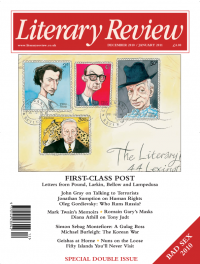Norman Stone
Off The Mark
When Money Dies: The Nightmare of the Weimar Hyper-Inflation
By Adam Fergusson
Old Street Publishing 256pp £12.99
When I was a young don at Jesus College, Cambridge, more than thirty years ago, the college council used quite solemnly to discuss which clergyman should be invited to give which visiting sermon. His fee came from an old trust fund: it was something like four guineas. The well-intentioned souls who set this up must have thought that gold-standard England would go on forever, never foreseeing that a civilised state would have a debauched currency. But so it proved, and in the 1970s the four guineas did not even cover the train fare.
Adam Fergusson’s gem of a book also goes back to that time. It was first published in 1975, and there hangs a tale. A disease known as ‘stagflation’ – a combination of stagnation and inflation – afflicted the Western world. The great growth rates of the Fifties and

Sign Up to our newsletter
Receive free articles, highlights from the archive, news, details of prizes, and much more.@Lit_Review
Follow Literary Review on Twitter
Twitter Feed
The latest volume of T S Eliot’s letters, covering 1942–44, reveals a constant stream of correspondence. By contrast, his poetic output was negligible.
Robert Crawford ponders if Eliot the poet was beginning to be left behind.
Robert Crawford - Advice to Poets
Robert Crawford: Advice to Poets - The Letters of T S Eliot, Volume 10: 1942–1944 by Valerie Eliot & John Haffenden (edd)
literaryreview.co.uk
What a treat to see CLODIA @Lit_Review this holiday!
"[Boin] has succeeded in embedding Clodia in a much less hostile environment than the one in which she found herself in Ciceronian Rome. She emerges as intelligent, lively, decisive and strong-willed.”
Daisy Dunn - O, Lesbia!
Daisy Dunn: O, Lesbia! - Clodia of Rome: Champion of the Republic by Douglas Boin
literaryreview.co.uk
‘A fascinating mixture of travelogue, micro-history and personal reflection.’
Read the review of @Civil_War_Spain’s Travels Through the Spanish Civil War in @Lit_Review👇
John Foot - Grave Matters
John Foot: Grave Matters - Travels Through the Spanish Civil War by Nick Lloyd; El Generalísimo: Franco – Power...
literaryreview.co.uk